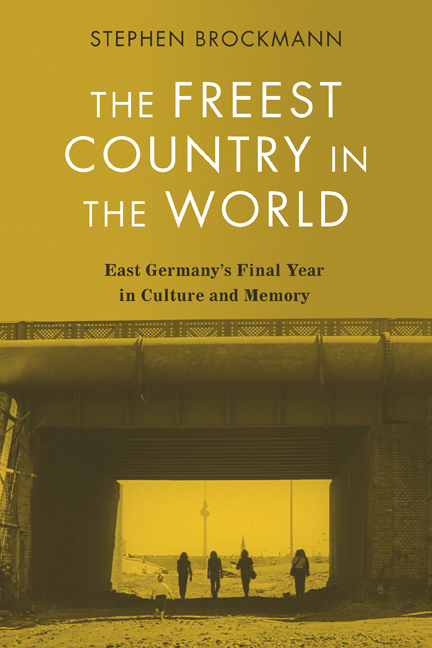Book contents
- Frontmatter
- Dedication
- Contents
- Acknowledgments
- Introduction: The Memory of Freedom
- 1 Protocols of History: Reunification Documentaries from 1989/1990
- 2 Anarchy in the GDR
- 3 The National Liberation Zone
- 4 Coming of Age as the State Dies: Three Novels and Their Heroes
- 5 Provincial Theater: Fiction Film Struggles to Address German Reunification in the Early 1990s
- 6 The Grand Theater of the East and the Imaginary Stasi: The Emergence of the Standard Depiction of German Reunification in Film and on Television
- 7 Ritual, Repetition, and Memory: Commemorating and Memorializing 1989/1990
- Conclusion: The Last GDR
- Selected Works Cited
- Filmography
- Index
4 - Coming of Age as the State Dies: Three Novels and Their Heroes
Published online by Cambridge University Press: 11 January 2024
- Frontmatter
- Dedication
- Contents
- Acknowledgments
- Introduction: The Memory of Freedom
- 1 Protocols of History: Reunification Documentaries from 1989/1990
- 2 Anarchy in the GDR
- 3 The National Liberation Zone
- 4 Coming of Age as the State Dies: Three Novels and Their Heroes
- 5 Provincial Theater: Fiction Film Struggles to Address German Reunification in the Early 1990s
- 6 The Grand Theater of the East and the Imaginary Stasi: The Emergence of the Standard Depiction of German Reunification in Film and on Television
- 7 Ritual, Repetition, and Memory: Commemorating and Memorializing 1989/1990
- Conclusion: The Last GDR
- Selected Works Cited
- Filmography
- Index
Summary
BY NOW THERE ARE MANY NOVELS that describe the collapse of the GDR, German reunification, and the first months and years of eastern Germany's existence in the expanded Federal Republic. Throughout the 1990s, German literary critics demanded such novels, but relatively few works actually addressed the topic. It takes time to write and publish a novel, after all, and many of the authors who ultimately chose to tackle the issue were at the beginning of their careers in the early 1990s or had not even begun. Peter Richter, the author of 89/90, for instance, was only fifteen in 1989. Most reunification novels have appeared after the turn of the millennium.
The most prominent example of a reunification novel published in the 1990s was Thomas Brussig's Helden wie wir (Heroes Like Us, 1995), which sought to deal with the opening of the Berlin Wall and the collapse of the East German state by using outrageous dark humor. In this novel the narrator—and protagonist—claims to have forced the opening of the Wall by exposing his monstrously enlarged penis—the result of a transfusion of blood from SED leader Erich Honecker—to GDR border guards on the night of November 9, 1989. Helden wie wir mocked what by then were fixed, heroic, and uncritical depictions of the events of October and November 1989. Brussig's protagonist, far from being a hero, is a sexual pervert and Stasi operative. East German citizens in the novel are not blameless conquerors of dictatorship and tyranny but rather conformists and tattle-tales. Precisely because of its irreverence and humor, the novel became a massive success: the best-known depiction of 1989 in the literature of the 1990s.
Brussig was to publish many more novels addressing life in the GDR and German reunification. Indeed, dealing with this topic was to become his literary mission. His novel Am kürzeren Ende der Sonnenallee (On the Shorter End of Sun Avenue, 1999) was an affectionate depiction of an East German adolescence. Precisely because of its presentation of a relatively normal development, it counteracted widespread discourse in the 1990s about GDR abnormality and totalitarianism.
- Type
- Chapter
- Information
- The Freest Country in the WorldEast Germany's Final Year in Culture and Memory, pp. 155 - 197Publisher: Boydell & BrewerPrint publication year: 2023



